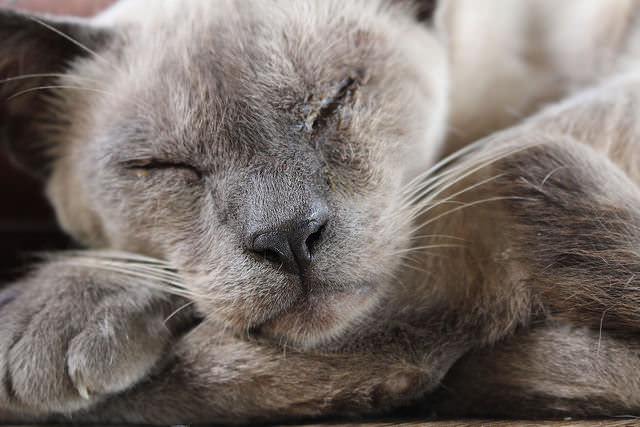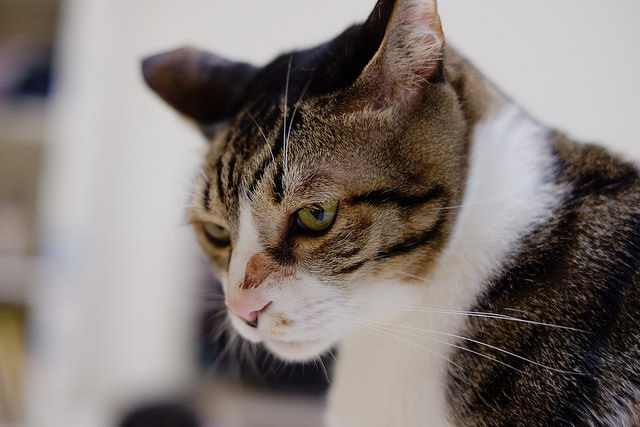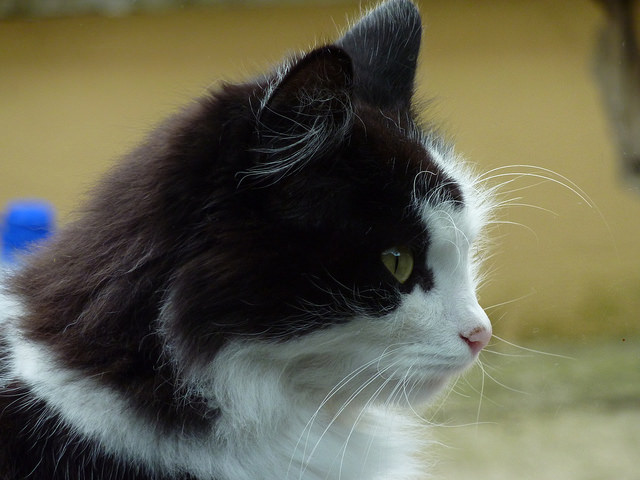The key to solving many of your cat’s behavior problems is, of course, understanding why she’s doing what she’s doing. In order to make a real change though, you have to also understand how your cat thinks and what will motivate her to act in more acceptable ways.

Image Source: Rebecca W via Flickr.com
How cats learn
Cats learn in a way similar to us– by observation, imitation, and trial and error. Most importantly, cats learn by experience. If she has a positive experience with something (say, she jumps into your lap and is immediately showered with kisses and head scratches) she’ll remember that experience and it’ll influence whether or not she attempts to jump into your lap later. If she has a negative experience, however, she’ll avoid repeating the action in the future. That’s why some cats urinate outside of the litter box when they have urinary tract infections, and why it can be hard to redirect them to the litter box even after the UTI is gone. A cat who has experienced pain while urinating in the litter box will associate the pain with the litter box and will reason that peeing in your closet is a much safer option.

Image Source: Hsu Luke via Flickr.com
If you pay attention, you may be able to see how your cat has used her observations of your home’s routine to manipulate you. In my home, for instance, my cat is a master at sending me subtle “give me treats now” vibes. She has learned that if she jumps onto a certain perch (conveniently located near where the treat jar is stored) and stares at me, I will sprinkle a few down for her and her sister. I fall for it every time, so she keeps doing it. It’s all very strategic. We’ve trained each other.
Your cat is very clever and very motivated by rewards. She is much more likely to behave in the way you want her to behave if she can reasonably expect that she’ll be rewarded for it. The reward can come in many different forms and can be anything from treats to a good head scratch. If she gets a positive reaction, she’ll keep doing it.

Image Source: Robert Couse-Baker via Flickr.com
Mistakes we make
Since cats are highly motivated by rewards, we have to be careful about how we respond to undesirable behavior. Many of us unintentionally reward it! Oops!
A few months ago, a friend of mine came to me desperate to find a way to stop her cat from waking her up at 5am. Each morning, Monkey would sit on her chest and yowl into her face. He’d even poke her face if she wasn’t reacting fast enough. And each morning, my friend would groggily slip out of bed, retreat to the kitchen, and fill Monkey’s bowl with breakfast. He was being rewarded for his behavior and had no motivation to stop.

Image Source: Sean MacEntee via Flickr.com
How to successfully train
The key to coaxing your cat into better habits is to make them more desirable than the bad habits. It’s pretty simple, actually.
- Reward good habits with treats, head scratches, and cuddles. Make it fun and pleasurable for her to scratch the sisal post instead of the side of the couch. Make her want to stay off the kitchen counter.
- Don’t reward undesirable behavior– and keep an eye on the ways you may reward it unintentionally. Make bad behaviors unpleasant so your cat will decide on her own that there is a better way to get the reward she wants.
In the end, cats live by a staunch “what’s in it for me?” policy. You can spend all the time and money in the world on trying to train your cat, but you won’t have any luck unless she actually wants to do whatever you want her to do.

